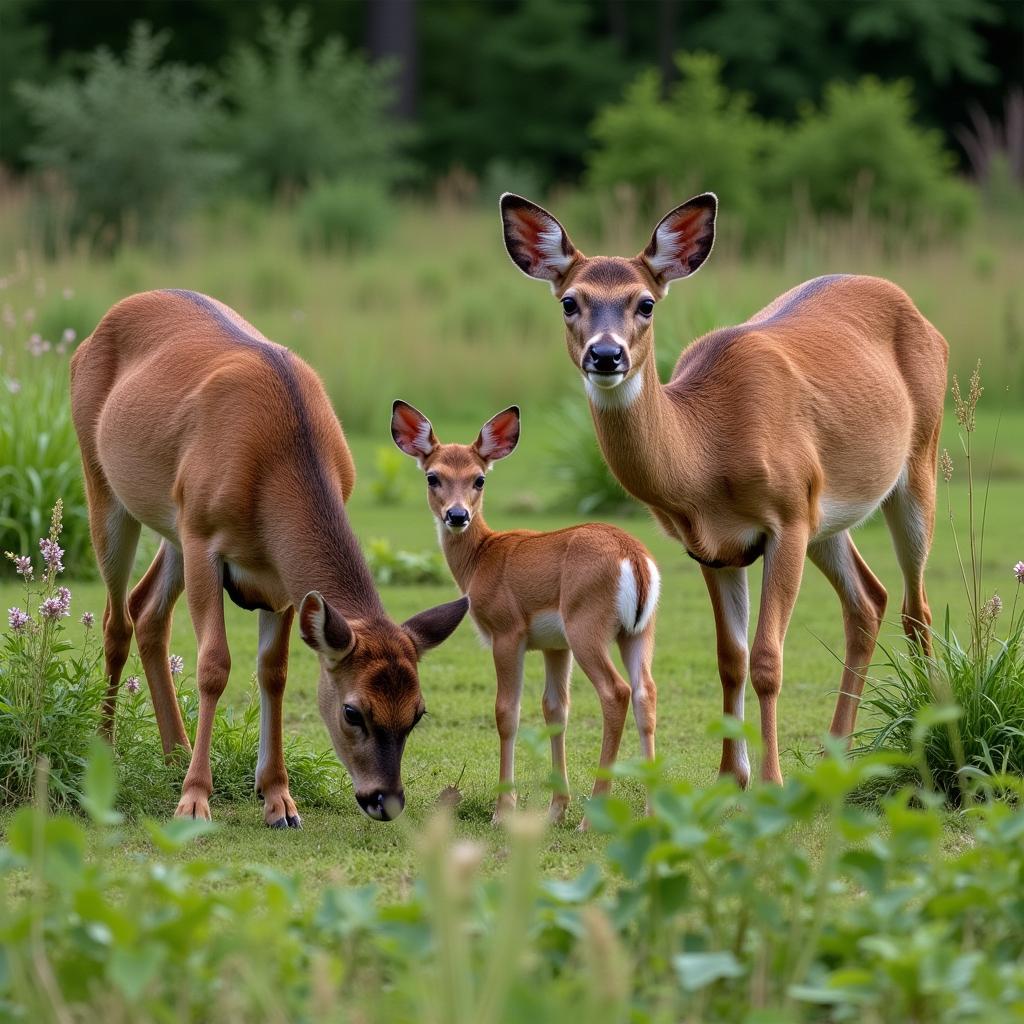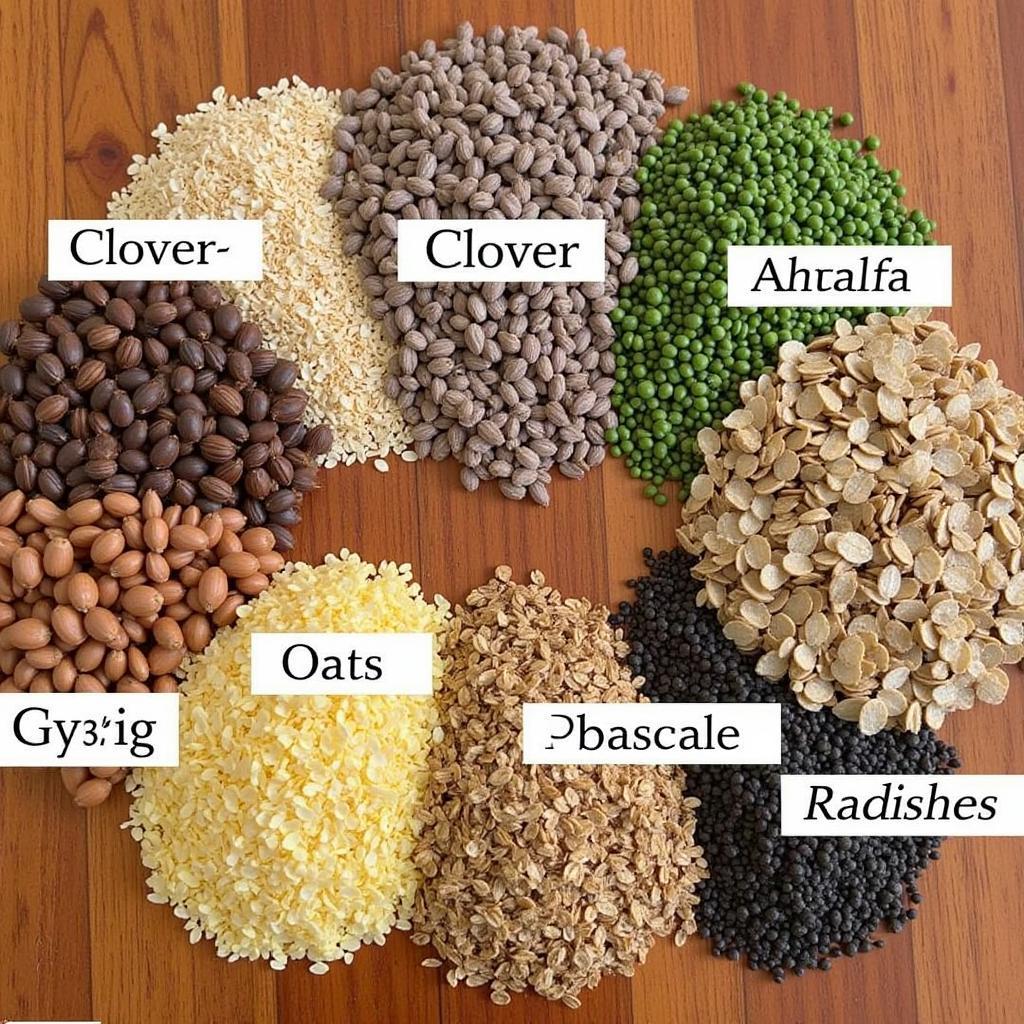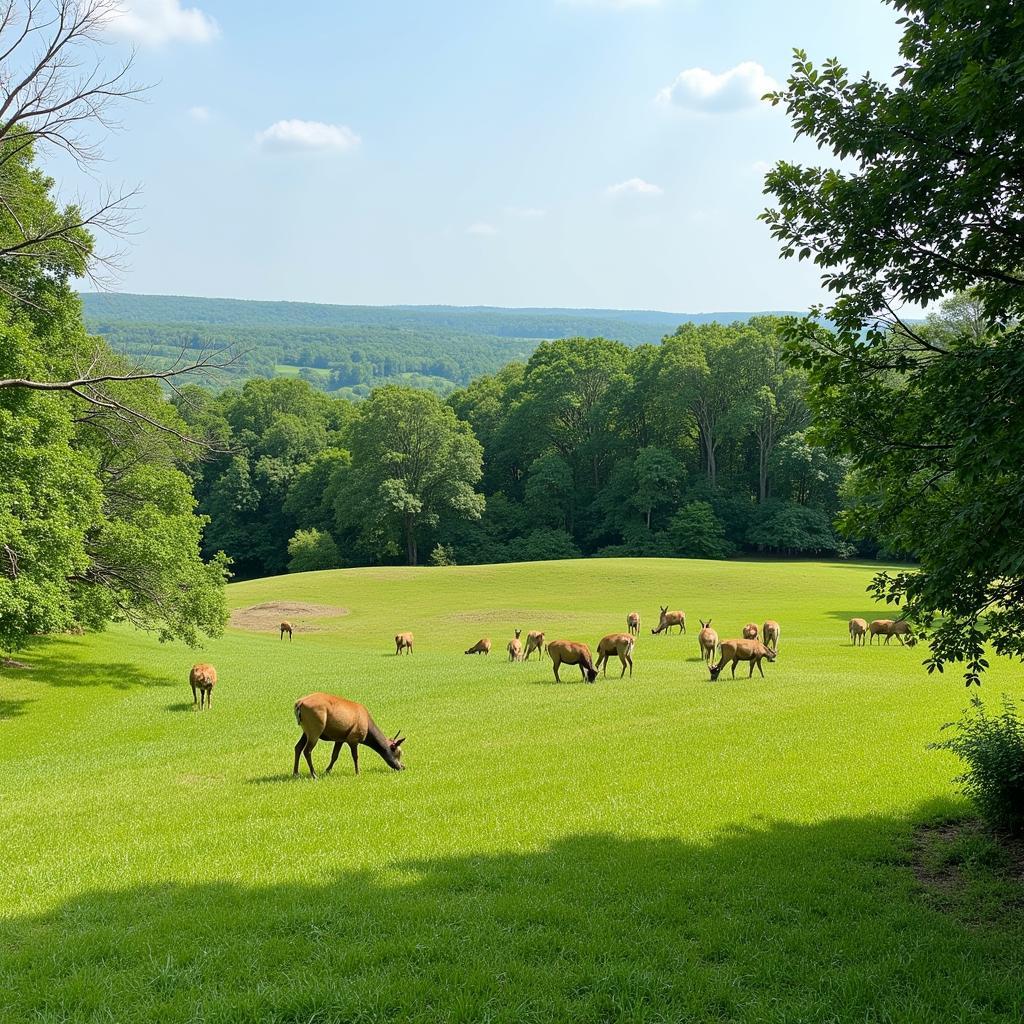Selecting the right Deer Plot Food Seed is crucial for attracting deer to your property and ensuring their healthy growth. Choosing from the vast array of options can be daunting, so understanding your goals and the specific needs of deer in your area is essential. This comprehensive guide explores the factors to consider when choosing deer plot food seed and offers valuable insights to help you make informed decisions.
Understanding Deer Dietary Needs
Deer are herbivores, meaning their diet consists primarily of plants. However, they are selective eaters, preferring specific types of vegetation based on factors like nutritional value, palatability, and availability. A deer’s nutritional needs vary throughout the year, influenced by factors like weather conditions and the animal’s stage of life.
For instance, during spring and summer, when readily available and highly nutritious, deer favor forbs, which are broad-leafed herbaceous plants. However, as fall approaches and temperatures drop, they shift their preference to woody brows, which offer sustenance during harsher months.
Understanding these dietary shifts is key to choosing the right deer plot food seed that caters to their needs throughout the year.
 Deer Feeding in a Food Plot
Deer Feeding in a Food Plot
Factors to Consider When Choosing Deer Plot Food Seed
1. Soil Type and Climate
Before selecting your deer plot food seed, it’s crucial to analyze your soil type and understand your region’s climate. Conduct a soil test to determine its pH level, nutrient content, and composition. This information helps you choose seeds that are well-suited to your soil and likely to thrive.
Equally important is considering your region’s climate, including average rainfall, temperature fluctuations, and frost dates. Some plants are more tolerant of drought conditions, while others thrive in cooler climates. Selecting seeds adapted to your climate significantly increases your food plot’s success rate.
2. Food Plot Objectives
Clearly define your food plot objectives before selecting your seeds. Are you aiming to attract deer for observation, provide supplemental forage during scarce periods, or create a hunting ground?
- If your goal is to attract deer for observation, opt for a fall deer food plot seed mix containing a variety of visually appealing and palatable plants.
- If your focus is supplemental forage, choose seeds that provide high nutritional value during periods when natural food sources are limited.
- For hunting plots, consider plants that create cover and attract deer during specific hunting seasons.
3. Seed Mixes vs. Single Species
Deciding between seed mixes and single species planting is another crucial factor. Seed mixes offer diversity, attracting deer throughout various seasons and providing a wider range of nutrients.
- You can find specialized mixes like the best food plot seeds for deer tailored to specific regions and deer preferences.
- Single species planting, while offering less variety, allows for focused management and can be highly effective for addressing specific dietary needs.
Ultimately, the choice depends on your food plot objectives, budget, and the level of management you’re willing to undertake.
Types of Deer Plot Food Seed
Navigating the market can be easier with knowledge of the various types of deer plot food seed available:
1. Legumes
Legumes, such as clover, alfalfa, and peas, are highly favored by deer and offer excellent nutritional value. These plants are rich in protein, essential for antler growth and fawn development. Legumes also improve soil health by fixing nitrogen, a crucial nutrient for plant growth.
2. Grains
Grains, including oats, wheat, and rye, provide deer with carbohydrates, an important energy source. They are particularly attractive during colder months when deer require additional energy to maintain body temperature.
 Different Types of Deer Plot Food Seeds
Different Types of Deer Plot Food Seeds
3. Brassicas
Brassicas, such as turnips, radishes, and canola, are known for their cold tolerance and high attraction rates during late fall and winter. They are rich in vitamins and minerals and provide deer with a valuable food source when other options are scarce.
4. Forbs
Forbs encompass a wide variety of plants, including chicory, sunflowers, and various wildflowers. They are highly palatable to deer and offer a diverse source of nutrients. Forbs can enhance the visual appeal of your food plot, making it more attractive to deer and other wildlife.
Tips for Successful Deer Plot Food Seed Planting
1. Proper Site Preparation
Thorough site preparation is critical for successful food plot establishment. Begin by clearing the area of existing vegetation, either mechanically or through the use of herbicides. Next, till the soil to loosen it and amend it with lime and fertilizer based on your soil test recommendations.
2. Planting Time
Planting time significantly influences seed germination and establishment. Consult a planting calendar specific to your region to determine the optimal time for sowing your chosen seeds. Factors such as soil temperature and moisture levels greatly affect germination rates.
3. Planting Depth and Spacing
Different seeds require specific planting depths and spacing for optimal growth. Refer to the seed packet instructions for guidance on these crucial aspects. Planting too deep or too shallow can hinder germination, while improper spacing can lead to overcrowding and competition for resources.
Maintaining Your Deer Food Plot
Once your deer food plot is established, ongoing maintenance is essential to ensure its long-term success. Regular monitoring for weeds and pests allows for timely intervention, preventing them from outcompeting your desired plants. Consider implementing a fertilization schedule based on your soil test results and the specific needs of your chosen plants. This helps replenish nutrients and promotes healthy growth.
 Deer Grazing in a Well-Maintained Food Plot
Deer Grazing in a Well-Maintained Food Plot
Conclusion
Choosing the right deer plot food seed is a crucial step in creating a thriving habitat that attracts and nourishes deer. By understanding deer dietary needs, considering your specific environmental conditions, and implementing proper planting and maintenance techniques, you can establish a successful food plot that benefits both the deer and your enjoyment of these majestic animals. Don’t hesitate to explore the various options available, such as the best deer food plot seed or no till deer food plot seed, to find the perfect fit for your needs.
FAQs
1. What is the best deer plot food seed for beginners?
A: For beginners, a blend of clover and chicory is an excellent starting point. These plants are relatively easy to grow, offer good nutritional value, and are highly attractive to deer.
2. How much deer plot food seed do I need?
A: The amount of seed required varies depending on the size of your food plot and the recommended seeding rate for the specific seed variety. Refer to the seed packet instructions for guidance.
3. Can I plant deer plot food seed in the shade?
A: While some deer plot food seed varieties tolerate shade, most prefer full sun exposure for optimal growth. Choose shade-tolerant options if your plot receives limited sunlight.
4. When is the best time to fertilize my deer food plot?
A: The ideal time for fertilization depends on your soil test results and the specific needs of your chosen plants. Generally, fertilizing in early spring and late summer or fall is recommended.
5. How often should I replant my deer food plot?
A: Replanting frequency depends on the type of seed used and its lifespan. Some seeds, like clover, can last for several years, while others, like grains, require annual replanting.
6. Where can I buy deer food plot seeds for sale?
A: You can find deer food plot seeds for sale at various retailers, including garden centers, farm supply stores, and online retailers.
7. What other factors can influence the success of my deer food plot?
A: Factors such as deer browsing pressure, weather conditions, and competition from surrounding vegetation can all impact your food plot’s success.
Need Help?
For personalized advice on choosing the best deer plot food seed for your specific needs, contact our experts at Mina Cones Food. Call us at 02437655121, email us at minacones@gmail.com, or visit us at 3PGH+8R9, ĐT70A, thôn Trung, Bắc Từ Liêm, Hà Nội, Việt Nam. Our dedicated team is available 24/7 to assist you. For further insights and resources on deer food plots, explore our other informative articles on our website.